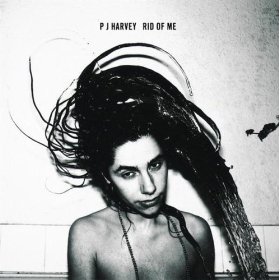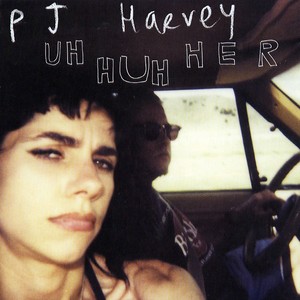FOREWORD: You know what – fuck the powers that be for not letting me get an interview with enigmatic British singer-songwriter PJ Harvey. The imbecilic jerk-offs at her record label only gave limited access to soon-defunct magazines like Spin, Rolling Stone, and Blender.
And all those antiquated rags wanted to do was paint her as a shy passive-aggressive bitch. When ‘04s amazing Uh Huh Her came out, I spent many hours on vacation at Sunset Beach, North Carolina, going through her back catalog to assemble the following piece. I’ve put this piece under the ‘interview’ section despite never having spoke a word to her. Live with it. This article originally appeared in Aquarian Weekly.
By the way, PJ Harvey’s crowning achievement may’ve come in 2011, with the release of her most compellingly political statement, Let England Shake. Showing remarkable restraint and subtle eloquence, she adds sax and zither to the guitar-etched war-torn sketches. Its bewitching title track invokes Eastern mysticism with its disquieting xylophone. But it’s the dirgey graveyard sentiments of flatulent sax-aided “The Last Living Rose,” the bleary-eyed death marches, and woeful balladic reminiscences such as “On Battleship Hill” that really squeeze every ounce of passion out of the lanky diva’s thematic, anxiety-filled, 12-song war protest. A muted cavalry horn sounds off during anti-war mantra, “The Glorious Land.” Like early rocker Eddie Cochrane spewed in “Summeretime Blues,” she’s gonna take her ‘problem to the United Nations’ (from “The Words That Maketh Murder”).
Alongside modern Buffalo folkie Ani Di Franco, Chi-town post-punk lynchpin Liz Phair, and audacious riot grrrl Kathleen Hanna (Bikini Kill/ Le Tigre), Britain’s bewitched white Blues brooder Polly Jean Harvey represented early ‘90s female independence. Fearlessly taking the initiative to compete against testosterone-fueled counterparts, they altogether left bold signature marks on the next generation of lauded lasses.
Igniting outrage, passion, and fury, each sturdily determined maverick indirectly helped autonomous Lilith Fair matrons and defiant lesbians Melissa Etheridge and the Indigo Girls gain accessibility on a grander level. Unlike hypocritical Kurt Cobain siphon, Courtney Love – an unstable contemporary accepted, then rejected by Hollyweird – these individualistic femmes retained conviction and reluctant sex appeal, savoring romance without becoming condescending drug-addled control freaks or domineering bitches.
But while Di Franco now simmers underground in political purgatory, Phair glimmers aboveground crafting questionable pop toss-offs, and Hanna shimmers in urban funk dirt, PJ Harvey hovers steadily overhead in a more linear rockist fashion. Her curious indiscretions, unnerving erudition, and naked emotionalism marked the desolate urgent rumblings of a youthful, naïvely liberated Brit on the cusp of brilliance.
 As blurred and unguarded as its tit-garbled front cover, the former art college students’ idiosyncratic ’92 debut, Dry, hurled wounded epistles at unspecific lovers. Fulfilling its titular prophecy, acrid instrumentation and tart retorts belie this veritable masterpiece. The workings of a dark, oppressed, paradoxical temptress not beholden to steadfast rules, Dry’s vicious spitefulness and hostile responsiveness express desperate vulnerability without sacrificing bitter righteous indignation. Although Harvey’s penchant for woeful regret and haunting anguish may relate inner fears and frailties, those aching feelings only tend to make her more determined to achieve freedom from male-dominated alt-rock stereotypes.
As blurred and unguarded as its tit-garbled front cover, the former art college students’ idiosyncratic ’92 debut, Dry, hurled wounded epistles at unspecific lovers. Fulfilling its titular prophecy, acrid instrumentation and tart retorts belie this veritable masterpiece. The workings of a dark, oppressed, paradoxical temptress not beholden to steadfast rules, Dry’s vicious spitefulness and hostile responsiveness express desperate vulnerability without sacrificing bitter righteous indignation. Although Harvey’s penchant for woeful regret and haunting anguish may relate inner fears and frailties, those aching feelings only tend to make her more determined to achieve freedom from male-dominated alt-rock stereotypes.
Vengeful love spurned attacks are met with painstaking reprieves best appropriated on the conflicted “Happy And Bleeding,” which stresses strong sentiments more assuredly as the song winds down. Betwixt eroticism and throbbing neuroticism wither inside the violated gloryhole of the stark “Oh My Lover,” trembling with the same seething ecstasy and pain her thunderous guitar venom injects into “O Stella.” Newfound adolescent sexual discovery elevates the subversive “Sheela-Na-Gig,” celebrating an Irish fertility goddess with excitable conversational invocations such as ‘look at these/ my child bearing hips/ look at these/ my ruby red lips’ before shouting the calamitous exclamation ‘you exhibitionist!’ at apathetic admirers.
Throughout, Harvey’s whirlwind voice hits jaunty heights, ripping apart soulful metaphors as her stinging guitar cuts like a dagger. Hurried hoe-down “Joe” splatters 6-string sparks in every direction while violin glissando spears the meandering retrenchment, “Plants And Rags.” Lurching lustily like punk godmother Patti Smith, she valiantly maintains the feisty feminist froth of Chrissie Hynde.
‘93s equally compelling Rid Of Me preserved the destitute primitivism and pensive moodiness of its predecessor. Its distinguished title track goes from seductive whisper to vehement scream as lone guitar, kick drum, and buzzy bass saddle the daringly insinuative refrain, ‘I’ll let you lick my injuries.’ “Legs’” implosive wails, “Man Size Sextet’s” Classical rails, and “Yuri-G’s” curdled entrails endow Harvey’s quivered salutations, feisty pleads, nagging howls, and whiny screams. The itchy “Rub Til It Bleeds” and the Tarzanian jungle-beaten “Me Jane” capture the dichotomy between difficult self-reliance and mired subservience. An obscure remake of Bob Dylan’s “Highway 61 Revisited” merely touches the surface of her poetic influences. But it’s the brazenly claustrophobic “50 Ft. Queenie” that highlights this scintillating set, as its ravished banshee moans may’ve inspired Yeah Yeah Yeahs no wave anti-fashion derelict Karen O. as well as a host of lesser (known) talents.
The sparer 4-Track Demos, rough drafts of Rid Of Me’s investigative Steve Albini-produced interrogations, adds the siren “Reeling,” the mobile “Driving,” the contemplative “Hardly Wait,” the swooping “Easy,” and the jittery “M-Bike” to eight previously unleashed originals. Defiantly tossing aside grungemeister Albini’s sludgy Melvins/Mudhoney-smudged soundboard, Harvey, still employing bassist Steve Vaughan and drummer Robert Ellis, proves her worth in salty pre-interpretations.
By ‘95s alluring respite, To Bring You My Love, the cynically luring diva uses schizoid confessional psychodramas to soothingly combat therapeutic resignation. Co-producers John Parish (whom she worked with on his bedeviled Dance Hall At Louse Point) and Flood (U2/ Nine Inch Nails/ Depeche Mode) join Pere Ubu keyboardist Eric Drew Feldman to nurture Harvey’s traumatic expositions with defiantly bristling tension. Playing the part of an ostentatious chanteuse, she routinely takes on various dispossessed caricatures. The fuzzy bass-boomed “Down By The Water” becomes a whispery parable of relinquished innocence, demanding an unnamed ‘big fish’ to ‘give me my daughter.’ It’s the perfect maternal setup for the distantly groaned dirge, “I Think I’m A Mother.” Persuasively suggestive, “Working For The Man” begs for salvation. Still trying to come to grips with the reality of abject sexuality, the flawed personalities herein developed suit the shady lady imagery she so enticingly projects.
Though ‘98s Is This Desire? sessions with Flood were initially halted halfway through two years hence, its agonizing anxiety seeps deep into perdition. Whereas preceding endeavors took flight in a chaotically oblique semi avant-garde manner unrestricted by trendy musical whims, this divergent venture surrenders to chic witching hour noir just left of Stereolab and their vogue post-disco ilk. Despite leaning closest to mentor Patti Smith’s constrained drowsy ballad styling on the lovely “Angelene” and ominously whimpering like a slithery torch singer through the lounge-y exotica of “The Wind,” lightly glazed techno-Industrial embellishments adorn mostly lulling arrangements. The ethereal drear drifting across “The River” slips into a languorous abyss, summing up this extremely vexatious experience best heard on a dank night cold and lonely.
Immediately, ‘00s quintessential Stories From the City, Stories From the Sea shifts away from the shattered dreamscapes of Desire, de-emphasizing lambasted leftover electronica derivatives for the vibrant guitar jangle of dynamic opener, “Big Exit.” The monumental angular guitar anthem, “This Is Love” (perhaps Harvey’s crowning achievement), and the strolling “Good Fortune” nicely dupe Patti Smith’s Manhattan renegade gypsy persona. The artful pop eloquence of Radiohead’s Thom Yorke bellowing below Harvey’s spoken verses on the truly resplendent “This Mess We’re In” fortifies and enhances this life affirming resurrection.
Some claim the irked petulance and cranky restlessness underlying ‘04s agitated Uh Huh Her dissects a dissolved relationship; countering the love-struck New York City parlance of Stories with confounding dread. Recorded mostly at home in Dorset, England, this latest batch of songs does more than offer tenderness on the block. The debilitating “The Life & Death Of Mr. Badmouth” temporarily cleanses her broken heart through tear-stained discourse: ‘your lips taste like poison.’ Its grief-stricken realness could be felt inside the stupefied dragged tempo and comatose bluesy mewl. On the sniping “Who The Fuck?” Harvey’s gusty guitar rifling seems informed by Nick Zinner, whose Yeah Yeah Yeahs’ partner Karen O. probably unknowingly profited from this tortured trailblazer. While “Pocket Knife” pierces like a dagger, the cataclysmic rallying cry, “The Letter,” and acidic lamentation, “Cat on The Wall,” eagerly repent. Classically arranged with percussive vibes, “You Come Through” cloaks a lipstick-traced sendoff. Wispy acoustic closer, “The Darker Days Of Him & Me,” appeals for redemption. Even though the vampish minstrel downplays the biographical nature of her musings, an undeniable sincerity surrounds these despair-ridden anecdotes.
Are my conjectures concerning this dissenting Pollyanna on the money? Should we believe Harvey’s living vicariously through the sadistic madness and voyeuristic intrigue of her grimmest songs? I doubt it. She’s too complex and delicately beautiful for that. Besides, instead of getting stuck in a loveless quagmire of self-doubt and disillusionment, this ravishingly leggy brunette keeps busy doing production work for fresh-faced singer Tiffany Anders and ageless gloomy rock dignitary Marianne Faithfull (whom she’s written a few tracks for).
Able to re-establish and sporadically re-invent her cosmopolitan image with only transient outsider assistance, Harvey remains a fascinatingly mysterious damsel in distress crosscutting obsessive carnal litanies with garish theatrical flare. Do you think Cleveland’s staid Rock And Roll Hall of Fame will redeem this iconic underground idol when the time comes? That’s questionable since the antiquated organization running the Hall of Fame has yet to confirm ‘80s pioneers Husker Du, the Replacements, the Minutemen, X, and Black Flag.
-John Fortunato